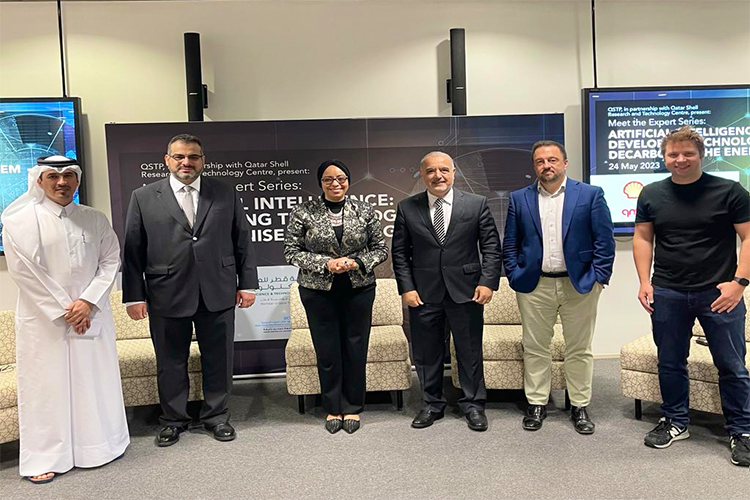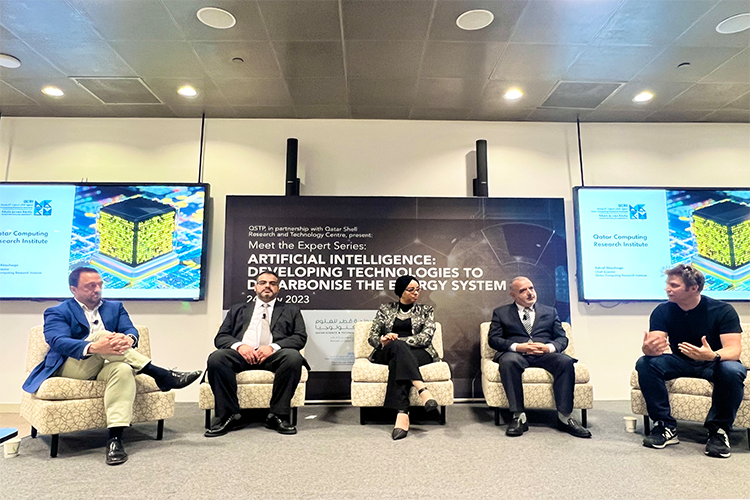As part of its ‘Meet the Expert’ series, Qatar Science & Technology Park (QSTP), jointly with its anchor partner, Qatar Shell Research and Technology Center, recently hosted a panel discussion to underline the value of Artificial Intelligence (AI) in propelling the transition toward a low carbon economy.
The session gathered global industry experts to review various aspects of adopting AI-centered technologies to realize emission reduction targets and create a more sustainable world.
Dan Jeavons, Vice President of Computer Science and Digital Innovation Technology at Shell, opened the session emphasizing the interplay between the energy transition and digital technology as two prominent forces shaping the world today. “How we think about digital technology, and within that AI, is arguably the most important change that is happening today. And it is not just digital tech that is going to help us accelerate the energy transition, but also our ability to deploy physical solutions”.
Drawing attention to some key areas in which Shell has realized the advantages of AI, Jeavons said: “At the top is the immediate benefit from deploying smarter solutions, to make our existing operations more effective and efficient. For example, we’ve deployed predictive [AI] models that are monitoring more than 16,000 pieces of equipment today, enabling us to predict failures. In addition to saving costs, time, and efforts, avoiding these failures also means a reduction in our CO2 emissions.”
AI is also crucially helping respond to the rapidly increasing customer demand for cleaner and sustainable solutions, pointed out Dr Marwa Al-Ansary, Genergal Manager of Next Generation Breakthrough Research at Shell, who works with a global team of 140 scientists and researchers. Referring to the stages of technology development i.e. discover, develop, demonstrate and deploy, Dr Al-Ansary said AI aids in processing large amounts of energy data to generate predictive insights which then facilitates tech innovators to move between each stage relatively faster.
Another panelist, Dr Adnan Abu-Dayya, Executive Director at Qatar Mobility Innovations Center, highlighted the center’s focus on enabling sustainable, smart and safe living using emerging technologies like AI and Internet of Things (IoT) to develop and deploy homegrown solutions across various industries in Qatar. Under its focus on decarbonizing the energy system, he said that QMIC is working with local stakeholders to use its digital expertise and tools to realize new efficient cooling solutions. The center is also pursuing a number of use cases for utilizing AI to optimize safety operations and remote sensing applications.
Discussing some of the risks associated with AI integration in the energy sector, Dr Ashraf Aboulnaga, Chief Scientist at Qatar Computing Research Institute, said: “While AI applications range from text analysis to predictive maintenance to designing novel materials, we must recognize that this technology comes with its own set of risks and it is important that we manage these risks when adopting AI in industrial projects.”
He underlined that the most important issue is the need to tackle quality and trustworthiness of data when deploying AI in safety-critical applications. Another broader issue is that of AI sovereignty which means that when several players utilize the technology, and especially when it involves a third-party, the associated risks such as privacy encroachments are much higher.
Participants also heard from Grant Totten, Head of Cloud, Analytics and Insights for TASMU, Ministry of Communication and Information Technology, Qatar, who shared some insights on how AI technology is supporting the TASMU platform to fuel partnerships across multiple entities and sectors and advancing its overarching mission to achieve smart city development.
QSTP, a member of Qatar Foundation, via the ‘Meet the Expert’ sessions seeks to foster collaboration, innovation, and entrepreneurship to realize Qatar’s economic diversification and its sustainable development. To learn more about the series, or stay tuned on upcoming sessions, please visit: https://qstp.org.qa/qstp-expert-series




